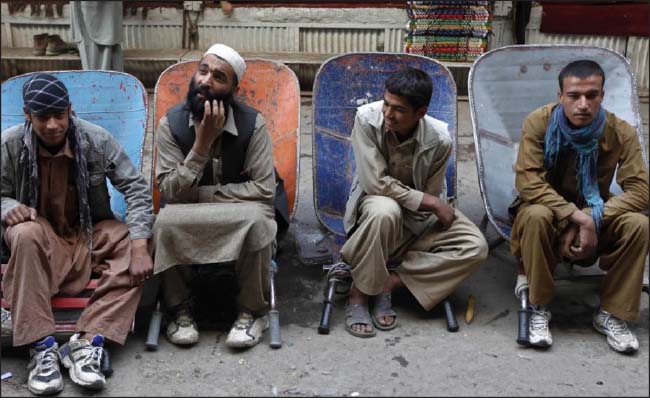The fruits of workers’ struggles were gained by upper-class throughout the history. Workers have been sweating in big companies from dawn to dusk but gained low wage in return without a contract or law to protect their rights and dignity. Women and children labored in farms and companies twenty-four/seven and put all their energy into backbreaking works to earn bread and butter. Justice and human dignity had no meaning for the upper-class and even some women were abused sexually by the company-owners. Suffering from manual labors on one hand and being treated unjustly and earning low wage on the other hand pressurized the employees mentally and physically.
Since the industrial revolution, the labor movement has been concerned how economic globalization would weaken the bargaining power of workers, as their employers could move to hire workers abroad without the protection of the labor standards at home.
Following World War one, the Treaty of Versailles contained the first constitution of a new International Labor Organization (ILO) founded on the principle that “labor is not a commodity”, and for the reason that “peace can be established only if it is based upon social justice”.
The regulation of working time is one of the oldest concerns of labor legislation. Already in the early 19th century it was recognized that working excessive hours posed a danger to workers’ health and to their families. The very first ILO Convention adopted in 1919, limited hours of work and provided for adequate rest periods for workers. Today, ILO standards on working time provide the framework for regulated hours of work, daily and weekly rest periods, and annual holidays. These instruments ensure high productivity while safeguarding workers’ physical and mental health. Standards on part-time work have become increasingly important instruments for addressing such issues as job creation and promoting equality between men and women.
Advocacy groups and non-governmental organizations draw on international labor standards to call for changes in policy, law or practice. Finally, a number of countries and regional organizations have incorporated respect for international labor standards into their bilateral, multilateral and regional trade agreement.
In addition to shaping law, international labor standards can provide guidance for developing national and local policies, such as employment and work and family policies. They can also be used to improve various administrative structures such as labor administration, labor inspection, social security administration, employment services and so on.
The philosophy behind emergence of labor law is to support the rights and dignity of workers. It should be noted that the labor law is imperative, which means that it is so strict that employees and employers cannot agree against it and have to sign the contract in according with this law. Since the labor law creates a just and humane relation between working-class and upper-class, it will reduce war and violence to a large extent. Although the initial aim of labor law was to necessarily protect the rights of the laborer, it now also supports the rational and legal benefits of the company-owners and employers. The labor law introduces a set of international rules such as the rights to free choice of jobs, appropriate salary/wage, enjoying holidays and having secure and sanitary environment and forbids forced and underage labors.
The principle of man’s natural dignity irrespective of his racial, ethnic and sexual backgrounds reduces the differences among the mankind, mainly the gap between the working-class and the upper-class. Moreover, justice – which has been the desire of cultures, social reformers and spiritual leaders – plays a crucial role in relations between the two classes. Cultivating fair relationship between the employees and employers will create job stability and establish welfare in a society. Similarly, social order, which originates from growth in production and creating stable and satisfactory job, will lead to public welfare.
Many countries, including Afghanistan, approved their national laws on the basis of international labor law so as to protect the rights of the vulnerable part of a community that is the working-class and let not their fruits of hard-work be exploited by the company-owners.
Afghanistan also considers workers’ rights and dignity and designated penalty for the violators. As a result, Afghanistan’s Constitution states in article 48 as, “Work is the right of every Afghan. Working hours, paid holidays, employment and employee rights and related matters shall be regulated by the law. Choice of occupation and craft shall be free within the bounds of law.” Moreover, it also forbids forced labor, mainly on children. The question is that do people follow the law?
The workers’ rights and dignity would not be trampled upon if people and employers followed the labor law properly. Despite national and international laws – which support the working-class – forced labor, child labor, long-hour works without extra payment, exploiting the energy of underclass and violating their rights still rule across the country. The poor succumb to work long hours in return for low wage, especially when the public wrestle with unemployment and encounter financial crisis.
The government, which has committed to “design and implement effective programs for developing industries” and “expanding production” for raising the standard of citizens’ life, failed to fulfill the mouth-watering commitments. Hence, only setting penalty and punishing the violators of workers’ rights will not alleviate the challenges, the government must provide job opportunities for citizens, develop agriculture, handcrafts, and animal husbandry, improve forests, build factories and perform all the commitments made in the Constitution to prevent from forced and child labors and provide welfare for the public.
Home » Opinion » Violating the Rights of Working-class
Violating the Rights of Working-class
| Hujjatullah Zia

